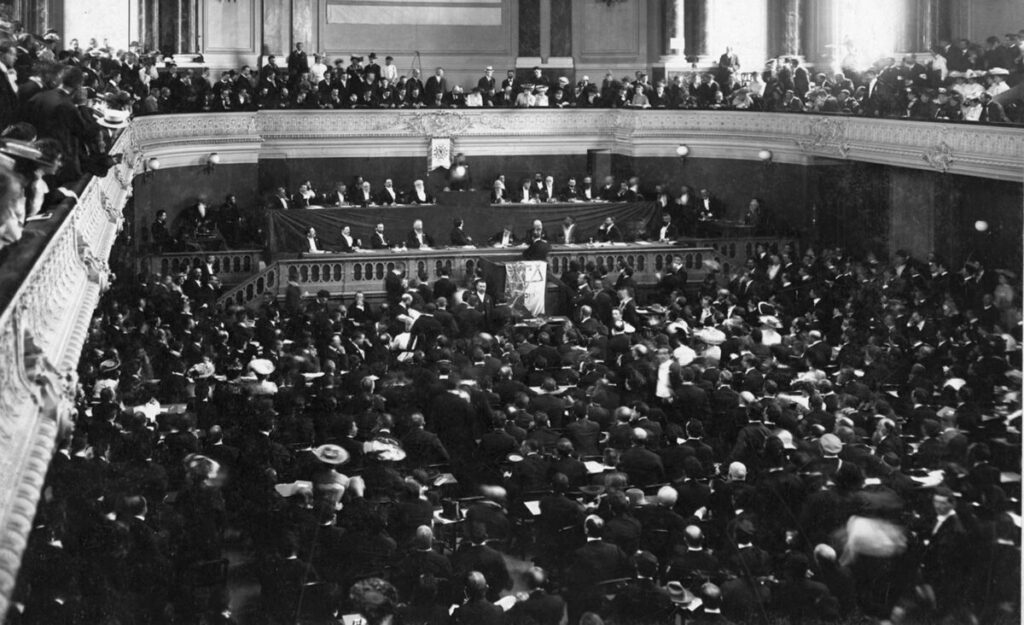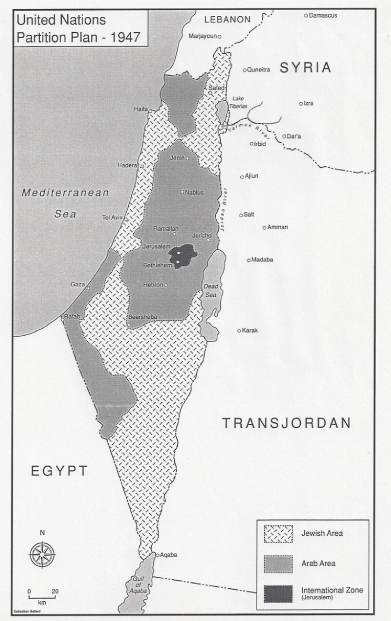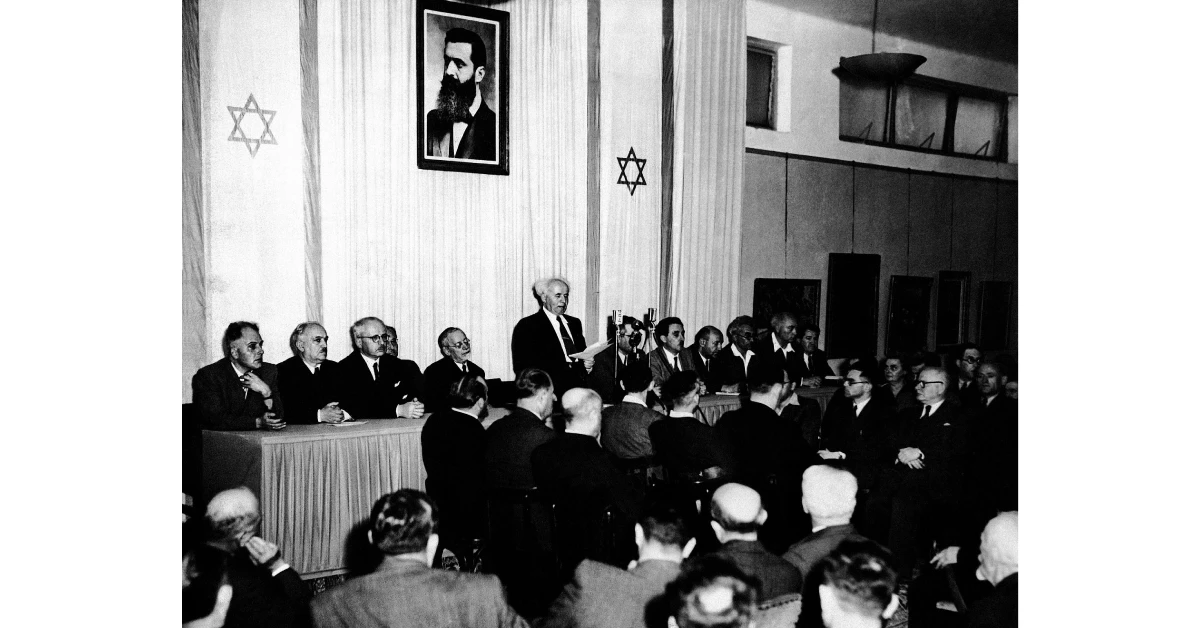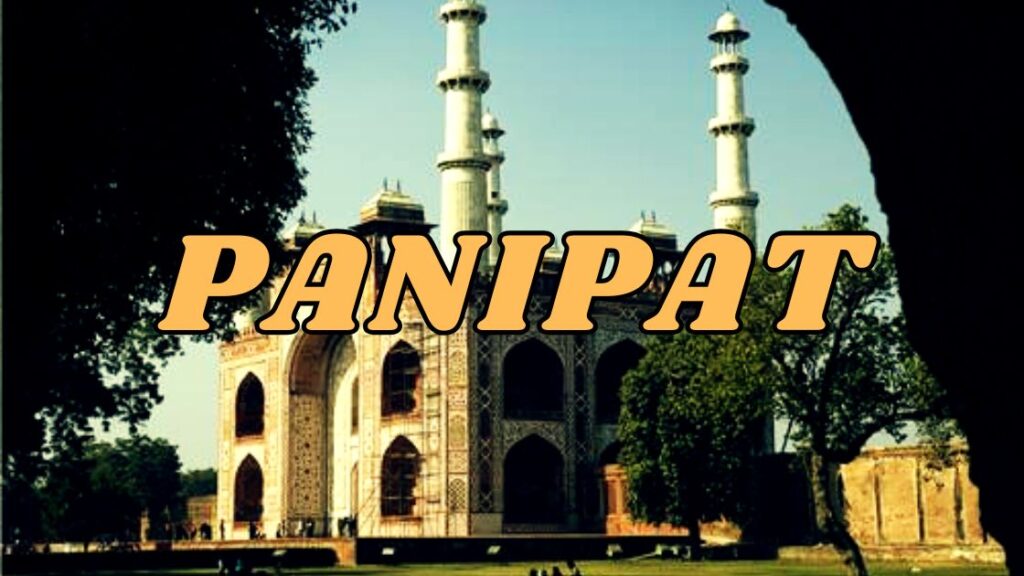Table of Contents
Introduction :
Israel, officially the State of Israel (Major non-NATO ally) is a country in the Middle East, located at the eastern end of the Mediterranean Sea. It is bounded to the northeast by Syria, north by Lebanon, east and southeast by Jordan, southwest by Egypt, and west by the Mediterranean Sea. Jerusalem is the seat of government and the proclaimed capital, although the latter status has not received wide international recognition. UN voted to divide Palestine to form an independent Jewish state in November 1947. In May 1948 Ben Gurion declared the independence of the new state of Israel.
Now, we will look at the events culminating in ” The Creation of the State of Israel. “
Historical Context :
Palestine was the homeland of Jews. Following the revolt of Jews against the Roman Empire, most Jews were driven out of their Homeland in AD 71. They got scattered all over Europe, mostly in Eastern Europe. There was a gradual trickle of Jews returning from exile over the following 1700 years. Until the end of the nineteenth century, there were not enough Jews to threaten the existence of Arabs in Palestine.

Zionist Movement :
Zionists were people who consider Palestine their ‘ National Homeland ‘ and called on Jews to resettle in Palestine. In 1897, World Zionist Organisation was formed at Basel in Switzerland by the Jews living in Europe.This movement gather pace due to prosecutions of Jews in France, Germany ,Russia and other European states. The main objective was that a Jewish state would provide a safe refuge for Jews from all over the world.
Balfour Declaration :
To get the support of Jews during WW1, Britain’s foreign minister, Arthur Balfour, announced that Britain supported the idea of a Jewish national home in Palestine but nothing shall be done which may prejudice the civil and religious rights of the existing non-jewish communities in palestine.
British Mandate for Palestine :
After WW1, the newly formed ‘ League of Nations ‘ gave the mandate of Palestine to Britain. Since the Balfour Declaration gave Jews a new ray of hope for a national homeland, large numbers of Jews began to arrive in Palestine. Arabs resented bitterly to this immigration and wanted an end to this. The British hoped to persuade Jews and Arabs to live together peacefully in the same state but they failed to understand the deep religious gulf between the two communities.
Holocaust :
Nazi persecution of Jews in Germany after 1933 caused a flood of refugees and by 1940 about half the population of Palestine was Jewish. After 1936, there were a series of violent protests and an uprising, which the British suppressed with brutality. British Peel Commission proposed dividing Palestine into Arab and Jewish states but Arabs refused it.
Erosion of British Authority :
Jews were determined to fight for their ‘national home’ after the holocaust and began a terrorist campaign against both Arabs and British. They had formed paramilitaries like Jewish Brigade, Irgun, etc. King David Hotel in Jerusalem, which was a British headquarters, was blown up. The British responded by arresting several Jewish leaders. British, weakened by the strain of WW2 asked the UN to deal with the problem.
Partition of Palestine :
To investigate a suitable course of action, the UN formed the UN Special Committee on Palestine (UNSCOP), an inquiry committee made up of members from 11 countries. The proposal to partition Palestine, based on a modified version of the UNSCOP majority report, was put to a General Assembly vote on November 29, 1947. The fate of the proposal was initially uncertain, but, after a period of intense lobbying by pro-Jewish groups and individuals, the resolution was passed with 33 votes in favor, 13 against, and 10 abstentions. Palestine was divided into Arab and Jewish states with the city of Jerusalem being governed by an International agency administered by the United Nations.

Aftermath :
Following the announcement of the UN partition plan in November 1947, Israel declared independence on 14 May 1948. The Arab-Israeli War of 1948 broke out when five Arab nations invaded the state of Israel immediately following the announcement of the independence on May 14, 1948. Under separate agreements Israel and Arab Nations agreed to a formal armistice line. Israel captured more territories than was given under the partition plan.
Conclusion :
The creation of Israel in 1948 was a significant event in modern history that emerged from a combination of historical, political, and humanitarian factors. It has had a profound effect on the geopolitics of the Middle East. The Cold War between the USA and the Soviet Union made the region more volatile resulting in two more wars between Israel and its Arab Nations. Israel has signed a peace accord with some of its Arab Nations. Political engagements and Peace Accords are the only way to make the region stable and prosperous.




